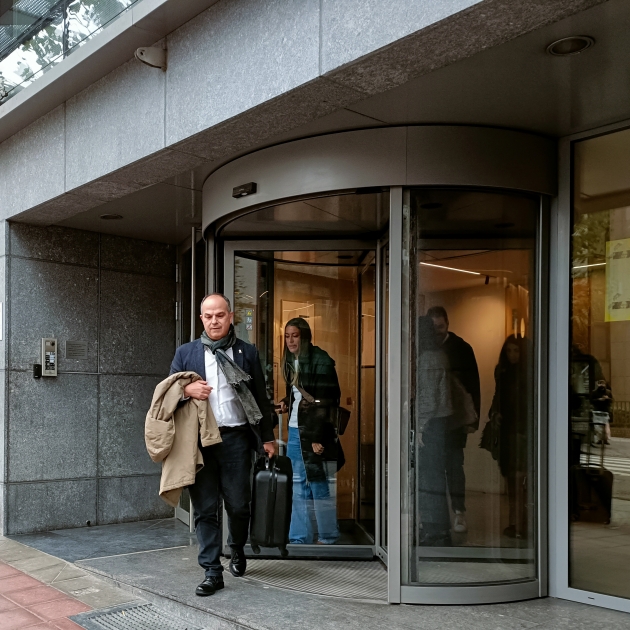The agreement that the Spanish Socialists (PSOE) and Together for Catalonia (Junts) are negotiating to enable Pedro Sánchez to form a new Spanish government is still not closed, despite the fact that the Socialists have been announcing its imminence for days. The senior leaders of Carles Puigdemont's party met again this Monday in Brussels and most of its members took the plane back to Barcelona in the early afternoon without being able to toast to an agreement. Throughout the day, just the same as last week, PSOE's organizing secretary, Santos Cerdán, was waiting at a hotel in the Belgian capital, ready to sign the pact when he had the green light. The scope of the amnesty to cover lawfare cases remains at the centre of the debate.
Once the secretariat of Junts had returned to Barcelona, the president of the party, Laura Borràs, and the general secretary, Jordi Turull, as well as the head of the parliamentary group in Congress, Míriam Nogueras, stayed with Carles Puigdemont in Brussels. However, by mid-afternoon both the Socialists and Junts began to issue messages to the effect that the pact could not be closed this Monday either and that the talks will have to continue on Tuesday.
Lawfare
The aim of Junts is that people who have been in the judicial spotlight due to their connection to the independence process but are being legally pursued for cases that have nothing to do with the 2014 or 2017 independence consultations in Catalonia should not be left out of the amnesty. The term "lawfare" - defined as the strategic use of legal proceedings to intimidate or hinder an opponent - refers to such cases. One example is the situation of Josep Alay, who is head of Puigdemont's office, investigated in the Volhov case and Democratic Tsunami, who also has a case open against him for misuse of public funds following a trip to New Caledonia on the occasion of the 2018 referendum in the Pacific Ocean territory. Turull guaranteed in a message to Junts executive members last Friday that the party would leave "no soldier in the stockade" with an amnesty that "only covered VIPs".
However, until this Sunday, the PSOE did not agree to lawfare cases. It opened up the question after finding that there was no other way to unblock the talks, which had been at a standstill since Friday. Junts are adamant that the law must not leave any doubt about the scope of the amnesty and that its application must not be left to the interpretation of the judges.
Puigdemont, investigated
However, over the course of this Monday, in addition to the obvious difficulties in concluding the amnesty text, there have been new developments at Spain's criminal court, the National Audience. While the negotiators are exchanging proposals on the wording of the law, judge Manuel García Castellón made public the resolution in which he had decided to investigate Carles Puigdemont and the general secretary of ERC, Marta Rovira, in the Democratic Tsunami case, open for crimes in the category of terrorism.
Not only that, the judge has asked the Civil Guard to investigate the link between the blockade of Barcelona airport which took place on the day of the Democratic Tsunami protest in 2019 and the death that day from a heart attack of a French passenger who was in Terminal 2. "The impact it had on people's lives and integrity cannot be minimized," warns the judge. This argument, if sustained, could lead to the Tsunami case being left out of an amnesty, whose draft text could wipe the slate clean for crimes in the terrorism category, with the exception of offences causing deaths or injuries.
In the evening, the impossibility of concluding an agreement between the PSOE and Junts on the amnesty law did not prevent the General Council of the Judiciary (CGPJ) from approving an institutional declaration against it. The text, promoted by the eight conservative members of Spain's judicial governance organ, was passed with nine votes in favour, five against and one vote blank. One of the progressive members, Alvaro Cuesta, did not come to the plenary. The declaration asserts that the amnesty law, not yet born, "violates the Constitution" and turns justice "into a chimera".
The PSOE, which throughout the day denounced several attacks made on different territorial headquarters of the party, closed the day with a new night of protests at several of its party headquarters and tension between protesters and police outside its Madrid base in Calle Ferraz.
